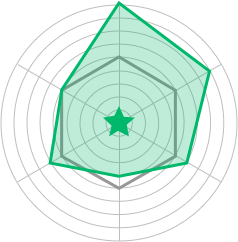“In most of us, by the age of thirty, the character has set like plaster, and will never soften again,” psychologist William James wrote in his book The Principles of Psychology.
120 year ago later most of us firmly still believe this.
Lately, I’ve been thinking a lot about change and the ability to change.
I wanted to find out if I could change.
But to do that I needed to get to know myself more first.
To know thyself is the beginning of wisdom. Socrates
This is why a few weeks ago I did what any sensible person would do and completed a self-assessment survey.
With twelve statements such as, ‘I am someone who is relaxed and handles stress well,’ and, ‘I am someone who tends to find faults with others,’ I was asked to rate these statements on a Likert-scale.
From a strongly disagreeing 1 to a strongly agreeing 5.
Now the answers to these statements are interesting in themselves but what I was really looking for, was how they mapped to the Big Five Inventory (BFI-10)1.
The statements themselves form a true-scored and a false-scored pairing, which in turn is used to calculate the score on a -4 to +4 scale of five different traits, with the average score being 0.

Taking inspiration from a growing need to expand the BFI with a sixth trait according to the HEXACO model, I added two more statements to my survey to also asses their suggested Honesty-Humility scale, bringing my total traits to six.
You can complete the HEXACO-PR-I yourself to find out what you’re like, it might surprise you.
Unlike the Myer-Briggs Type Indicator (MBTI) test I did a while back ago, whose scientific value has been proven to be about as useful as astrology—which in turn is about as useful as using snails to predict the future—the BFI-10 has a much greater reliability (i.e. the same person taking the test on different occasions still gets the same results) over a longer period of time.
But this is all assuming I already know myself well, which if that’s the case then the test itself is kind of pointless, isn’t it?
Which is why a few weeks ago I did what any sensible person would do, I reworded the statements and sent the same survey to my friends, family and co-workers.
BFI-10 is designed to work as a self- and observer report.
From friends who have known me for a year to those who have known me for almost two decades. From current co-workers to Kris, my old boss at Squiders, I wanted to get a clear picture of myself.
With the same twelve statements such as, ‘Carlos does a thorough job,’ and, ‘Carlos has an active imagination,’ I asked people, who sometimes know me better than I do, to rate the statements using the Likert-scale again.
The survey was anonymous, to allow people to be honest without fear of hurting my feelings—a couple of people doubted it was anonymous which ironically already tells me that they think I’m dishonest.
After about a week, the results were in.

I took a deep breath.
I was ready to find out just how big of an asshole I am.
Hmmm, maybe I’m not that big of an asshole?
Overall, that actually looks like it matches my self-assessment better than I had anticipated.
But what does it all mean?
Openness to experience
People who score high are generally open to new activities and new ideas. They tend to be creative, intellectually curious, and sensitive to art and beauty. High scorers tend to prefer and do better in scientific and artistic occupations.
They are more likely to hold liberal political attitudes, prefer classical, jazz, blues, and rock music, and engage in drug use.
People who score low tend to be traditional, down-to-earth, and stick with tried-and-true ways of doing things. They prefer the familiar over the new, and the concrete over the abstract. Low scorers tend to prefer and do better in conventional and practical occupations.
They are more likely to hold conservative political attitudes.

I’d like to think I’m open to new experiences and by the looks of it, most people would agree. I’m quite happy with this, it matches my self-image.
Conscientiousness
People who score high tend to be organized and responsible. They work hard to achieve their goals and see tasks through to completion. High scorers tend to earn higher grades in school and perform better in many occupations.
They are more likely to be religious and hold conservative political attitudes. They tend to exercise more, have better physical health, and live longer.
People who score low tend to act spontaneously rather than making plans, and find it easier to look at the big picture than pay attention to details. They prefer to jump between tasks, instead of finishing one at a time. Low scorers are more likely to hold liberal political attitudes.
They tend to engage in more risky behaviors, such as smoking, alcohol consumption, drug use, and risky sexual activity.

Another one I’m quite happy with.
Though having said that, “likely to be religious and hold conservative political attitudes,” sounds like something I will want to keep my an eye on.
I don’t want my libertarian socialist attitudes to turn into conservative attitudes.
Extraversion
People who score high tend to be talkative and energetic. They like being around people and are comfortable asserting themselves in a group. High scorers tend to have more friends and dating partners and are seen as more popular. They generally prefer and are successful in, social and enterprising occupations. They are more likely to serve in community leadership roles and to do volunteer work.
They tend to prefer energetic music such as hip-hop, rock, and heavy metal, exercise more frequently, and are more likely to play a sport. They experience more frequent positive emotions and react more strongly to positive events.
People who score low tend to be socially and emotionally reserved. They generally prefer to be alone or with a few close friends and keep their opinions and feelings to themselves. Low scorers tend to pursue and do better in, jobs that involve independent work rather than social interaction.
They are less likely to engage in thrill-seeking or risky behaviors, such as smoking, alcohol consumption, and risky sexual activity.

This is interesting. People think I’m more extrovert than I think I am.
Maybe my self-image needs to catch up a little?
I mean, I do like heavy metal so it must be true.
Agreeableness
People who score high tend to be considerate and polite in social interactions, and enjoy cooperating. They find it easy to trust people and feel compassion for those in need. High scorers tend to be well-liked by their peers and establish satisfying and stable close relationships.
They generally prefer and do better in social occupations. They are more likely to be religious, to serve in community leadership roles, and to do volunteer work. They tend to prefer pop, country, and religious music.
People who score low express themselves directly and bluntly, even at the risk of starting an argument. They enjoy competition and tend to be skeptical of other people’s intentions. Low scorers tend to earn higher salaries and are more likely to engage in some risky behaviors, such as smoking and aggressive driving.

This is the first one which came as a bit of a surprise. I think I’m below average when it comes to being agreeable. Or more challenging than supportive, as they [scientists] would prefer to call it—they’re still deciding it.
But other people seem to think differently.
The difference isn’t big but it does suggest that I’m less of an asshole than I think.
Neuroticism
People who score high tend to be emotionally sensitive, and have up-and-down mood swings. They experience more frequent negative emotions and react more strongly to negative events.
People who score low tend to be emotionally stable and resilient. They usually stay calm, even in stressful situations, and can quickly bounce back from negative events. Low scorers tend to feel a greater sense of well-being.

This one is kind of all over the place as far as people are concerned, which tells me I need to look more into it and understand what’s going on here. In their defense, I can understand why, as especially in the past two years I have been all over the place emotionally.
Overall though, I would say that I am emotionally sensitive, something I’m already working on and will continue to figure out.
Not to mention that the very existence of this entry proves a certain level of neuroticism.
Honesty-Humility
Persons with very high scores on the Honesty-Humility scale avoid manipulating others for personal gain, feel little temptation to break rules, are uninterested in lavish wealth and luxuries, and feel no special entitlement to elevated social status.
Conversely, persons with very low scores on this scale will flatter others to get what they want, are inclined to break rules for personal profit, are motivated by material gain, and feel a strong sense of self-importance.

I’d like to think I’m very middle-of-the-road when it comes to being honest and humble.
By the looks of it, people agree with that.
But I wish I was more honest and humble because it’s something I value a lot.
So I want to work on this one too.
These traits represent broad areas of my personality. Research has shown that these groupings of characteristics often occur together.
Not always though, as a person is complex and nuances. Look ma, I’m complex and nuances.
Another study looked at the genetics of the traits which suggests that traits such as Openness to experience are hereditable at 61 percent and Agreeableness and Neuroticism are at 41 percent.
Which to me suggests that some traits are easier to change than others.
And here we have it.
Me, in a nutshell.
My entire complexity, or lack thereof, put into six measurable traits which when coupled with a standard IQ test is meant to be a pretty reliable indicator for how happy and successful I’ll be in life. No pressure ey.
I guess the question now is, can I change any of this?
Or, as William James says, has my character already set like plaster?
-
Rammstedt, B. & John, O.P. (2007). Measuring personality in one minute or less: A 10-item short version of the Big Five Inventory in English and German. Journal of Research in Personality, 41, 203–212. ↩